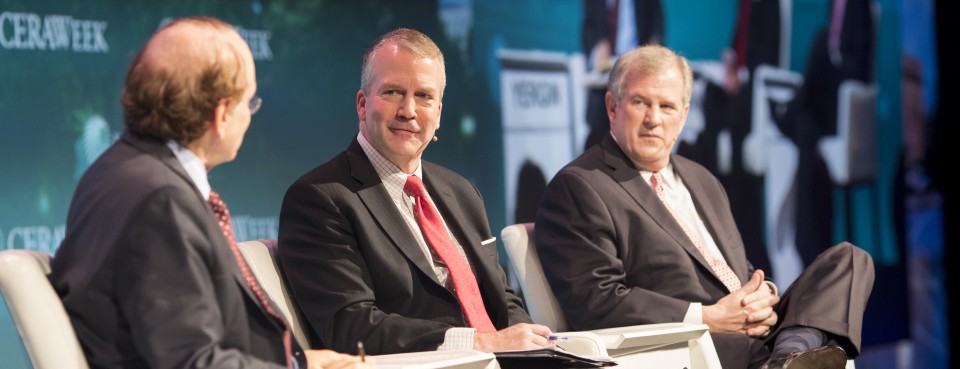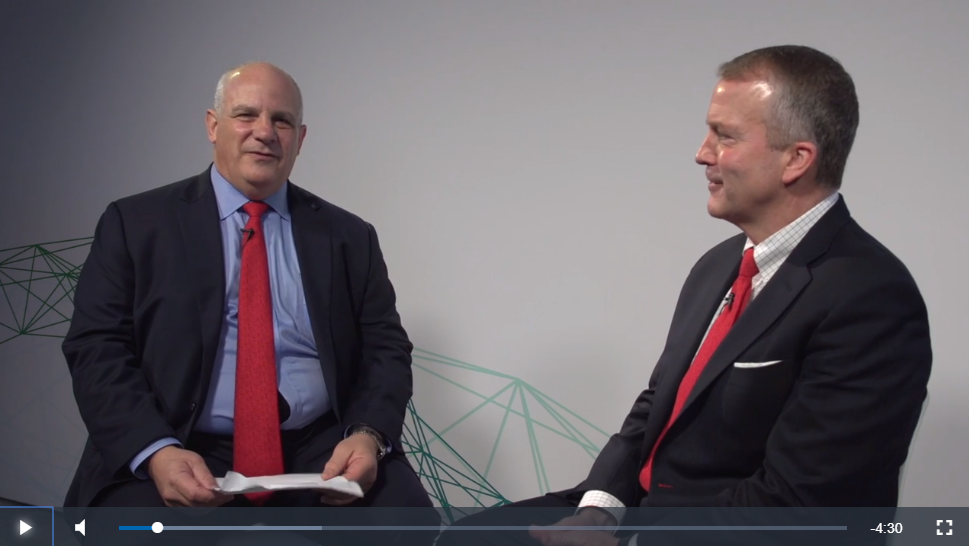Sullivan Advocates for Alaska Energy at CERAWeek 2018
“A lot of excitement on what’s going on in Alaska. I’m here in part to make sure people are aware of that.”
WASHINGTON, DC – Yesterday, Senator Sullivan (R-AK) participated in the opening policy dialogue of CERAWeek 2018 – an annual energy and technology focused conference in Houston, Texas. Sullivan was joined by Daniel Yergin, IHS Markit Vice-Chairman and conference chair, and Greg Armstrong, Chairman/CEO of Plains All American, as he discussed the policy successes of 2017 – including historic tax reform legislation, efforts to streamline permitting for U.S. infrastructure, new opportunities for oil and gas exploration and development like the 1002 Area of ANWR, and optimism for Alaska and American energy prospects.

Daniel Yergin, Senator Dan Sullivan, and Greg Armstrong participating in the opening dialogue session at CERA Week 2018
Numerous publications covered Senator Sullivan’s remarks and subsequent panel discussion, which included discussions on future lease sales in ANWR’s 1002 as well as his reaction to the proposed tariffs on foreign steel and aluminum announced by President Trump late last week.
CERAWeek 2018 News Coverage:
- The Hill: Alaska senator- Arctic refuge drilling sale could start next year
- Platts Energy: CERAWeek – First US ANWR oil sale could be held in 2019 - US senator
- Washington Examiner: Alaska senator says opening of Arctic refuge could start next year
- The New York Times: Trump Reaffirms Commitment to Tariffs but Opens Door to Compromise
- Time Magazine: A ‘Major Second Wave’ of U.S. Fracking Is About to Be Unleashed Upon the World
- E&E News: Steel tariff debate spills into energy gathering
- Washington Examiner: Senator, pipeline CEO warn Trump steel tariffs could harm 'energy dominance' agenda
- CNBC: Trump steel tariffs hit raw nerve in energy –US pipelines for oil boom rely on foreign steel
- Bloomberg: Steel Tariffs Should Focus on the ‘Real Problem’
Before his remarks at CERAWeek 2018, Senator Sullivan sat down with James Rosenfield, Senior Vice President of IHS Markit, to discuss his efforts to streamline the federal permitting process and opportunities he sees for oil and gas exploration in Alaska. That Q&A can be found below.

Senator Dan Sullivan speaking with James Rosenfield, Senior Vice President of IHS Markit, at CERAWeek 2018 (click image or here to watch)
JAMES ROSENFIELD: You’ve been a leading proponent of streamlining permitting processes, why is this so important for infrastructure?
SENATOR SULLIVAN: It’s important for a couple reasons. A, just to get projects online and producing. Unlike other countries – other industrialized democracies – in the United States, whether it’s pipelines, or roads, or bridges, it can take seven, eight, nine, ten years to get through the permitting process. This is something I think there’s bipartisan support to move forward on. The other reason though is when you actually have certainty in the permitting process – say not ten years but maybe a year and a half or two years – you are then able to bring in private sector capital to our infrastructure. Look, American infrastructure needs – it has to be a combination of federal government spending – but a huge part has to be in the private sector. And when you have a certainty in permitting you can bring that private sector money to the table in terms of infrastructure. So it’s really important.
JAMES ROSENFIELD: So what’s wrong with the infrastructure system in the U.S. and how does your Rebuild American Now Act fix the problem?
SENATOR SULLIVAN: On the federal side, it is this issue of multiple agencies that are in the permitting process for infrastructure projects and again it just goes to the delay, the delay, the delay. Simple things like permitting a bridge can take on average in America six to seven years. Pipelines, we’ve seen, can take almost a decade. So, it’s the timelines and the delays and the litigation that causes these delays. What my bill does, the Rebuild American Now Act – we have a lot of cosponsors in the Senate ,we have all the building trades in America; the men and women who build things are all supportive of my legislation – but it looks to streamline the process, bring down the timelines, have a single agency in charge of making decisions, and also looks at the NEPA process – the National Environmental Policy Act – in terms of these NEPA reviews and these thousands and thousands of pages that come out of this process; costing millions of dollars. It actually streamlines that as well. We think there should be strong bipartisan support for this and we’ve been working closely with the Trump administration on their permitting plan and a lot of it deals with streamlining the permitting process and that’s what my bill does.
JAMES ROSENFIELD: Let’s turn to Alaska. Do you see a revival of oil and gas exploration in Alaska?
SENATOR SULLIVAN: Absolutely, you see companies like ConocoPhillips, a lot of the independents, are exploring in ways that they haven’t done in decades. And again, part of this is legislation and part of this is the new administration that’s helping us in Alaska. I’ll give you two examples – the National Petroleum Reserve in Alaska. That is set aside by the Congress – it’s on the west side of the North Slope – for oil and gas development. The previous administration restricted access to the NPR-A. This administration – from the federal perspective – is opening that access. We have a lot of companies interested in that. Second, and maybe even more importantly, you may have seen in the tax reform bill that after 40 years we were finally able to get passed and signed by the President the opening of a small portion of the Arctic National Wildlife Refuge – ANWR – for responsible exploration. This is a strong bipartisan issue in Alaska. ANWR, a lot of people consider it one of the great, last conventional oil plays in the world – next to existing infrastructure. We’re hoping to have a lease sale as early as 2019 on that. But there’s a lot of interest, a lot of excitement on what’s going on in Alaska. I’m here in part to make sure people are aware of that.
###
Next Article Previous Article
